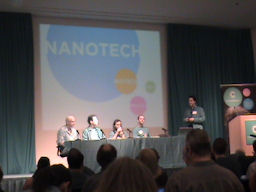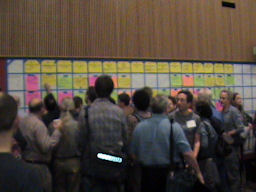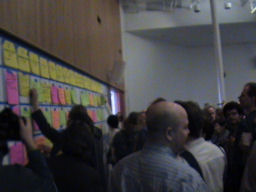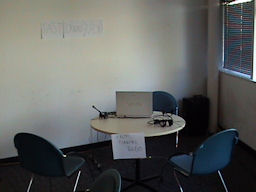Convergence 08 Day 1 Continued
First off, credit where it's due -- our good friend George Dvorsky is providing updates in near real-time via his blog and pretty nearly real real-time via Twitter, so he is the guy to catch you up on the latest Convergence 08 goodness.
I gave a fair run-down of what went on yesterday on the Podcast, but I have a few notes in addition, so here goes:
Once again, George gives the definitive coverage of the opening panel on AI. The entire discussion was worthwhile, and I was particularly impressed with the answers that Ben Goertzel gave to the first three questions. The first question was "Why are you here?" Ben pointed out that he's been thinking about these issues since childhood and that he first attempted to build a thinking machine when he was 16-17 years old. When I look back on the kind of stuff I was doing and thinking about when I was that age, I can't help but be impressed.
The second question had to do with the technology and the Haves vs. Have Nots, (and issue we've been dealing with lately from a somewhat different point of view) and whether technology is exacerbating economic differences. Ben talked about harsh economic conditions that he has observed up-close in Brazil -- and noted that conditions are even worse in other places, including parts of Africa. He said that his heart goes out to people living under such conditions, and that he feels that the greatest leverage he can exercise to help them is to continue his work towards artificial intelligence, noting that AI is a major component in bringing about a world where scarcity no longer exists. Ben notes that in a future world where material scarcity has been eliminated, "haves vs. have nots" will be more a question of psychology and culture than material well-being.

Finally, the third question to the panel was what would you do if you were appointed by President-Elect Obama to the new post of CTO. All the panelists gave intriguing answers, but Ben's cut straight to the heart of the matter. It's insane to put a trillion dollars into corrupt banks and failing auto makers. If you really want to push the economy forward, put that money into nanotechnology and AI research.
Amen.
A couple of additional notes on the Paul Saffo keynote (again, well-covered by George). Paul used the typical S-curve that technological developments follow to show how technologists often make bad predictions twice -- first by being too optimistic just when an initial slow-down is likely to occur, then by being too pessimistic just before the big push is about to occur. Very interesting.
Yesterday, I pondered whether life extension is going to be the next personal computer / Internet revolution. Paul showed a graph tracking both of those major trends, examining what the enabling technologies behind them were, and made the following forecast: the coming thing is robots. So if you're looking to invest in the Next Big Thing, take a look at what's going on in that field.


Folks creating their own agenda with the Big Board.

Our studio.

What it should have looked like.
Day 2 looms. We have our second edition of FFR, pus I think I'll be leading a session. More later.


